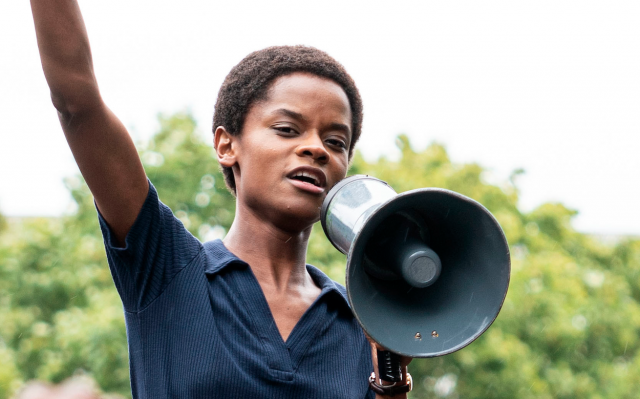Mangrove: Put the Charge on Me, by David Bax

There’s a lot of reggae and rocksteady on the soundtrack in Steve McQueen’s Mangrove (including a handful of classics by Toots and the Maytal, whose frontman Toots Hibbert passed away only a couple of months ago). And why wouldn’t there be? It’s a film that takes place in the late 1960s and early 1970s whose principle characters are almost entirely West Indian. But tracks like “Monkey Man,” “54-46” and “Pressure Drop” aren’t just meant as shortcuts to establishing a place and time; this isn’t Forrest Gump. This energetic music blends with the accents and patois that echo off the walls of this neighborhood and its nexus, the Mangrove Restaurant, plugging the viewer into not just where and when these people are but who they are. McQueen employs sound to beam empathy into our hearts, ensuring we’re on the side of the protagonists even before we see them harassed and beaten.
Mangrove tells the true story of the “Mangrove Nine,” a group of black men and women who were arrested and tried for inciting a riot after a protest against the police who had repeatedly targeted the Mangrove Restaurant for raids. That means McQueen faces the uphill struggle of making interesting that most depleted cinematic subgenre, the courtroom drama, making it all the more impressive that he succeeds.
These events took place in London’s Notting Hill neighborhood, which was long home to many West Indian Londoners before gentrification turned it into the kind of place where one might imagine Hugh Grant owning a charming bookstore. McQueen even gives us a visual effects-assisted glimpse at the beginning of that process, showing us a freeway extension under construction. For other examples of how freeways destroyed poor communities of color and increased ghettoization, see pretty much any major American city in the mid-twentieth century.
In a later sequence of considerable power, McQueen uses the fact that Mangrove takes place over the span of years to show us the quick progress of gentrification in a stark, staccato montage of still images that go from black and white to the magazine-ad color. Mangrove, it should be noted, is the first entry of a five film anthology called Small Axe airing on the BBC in the UK and streaming on Amazon Prime here in the States; subsequent installments will be released each week. Filmmaking for television, you don’t need me to tell you, has advanced substantially over the course of this century so far but there’s still something undeniably filmic about Mangrove and it’s not just the scope aspect ratio. Touches like the Mangrove’s owner, Frank Crichlow (Shaun Parkes), overtaking the fixed, mid-height camera in his rage at the officers of the court so that we soon find ourselves contemplating the placket of his shirt while hearing his vociferations or the focus on the shadow of Black Panther organizer Altheia Jones (Letitia Wright) on a rainy car hood so that her dark figure shimmers with a bullhorn in one hand and a raised fist in the other are beautiful and provocative in a way that is, unfortunately, still rare on television, where imagery continues to play second fiddle to plot concerns.
It’s no surprise, of course, that McQueen traffics in bold visual choices; it’s kind of his trademark. His usual tricks are on display in Mangrove, from the ostentatious symmetry to his very particular control over the color palette. But while past works have felt stifled by his meticulousness, here the aesthetics are in service to the film instead of the other way around.
In its time period and its real life story of Black people abused by a racist police force, Mangrove invites comparisons to Kathryn Bigelow’s Detroit and comes out the victor in every way. That’s because it treats its Black characters as more than just victims and lets us experience not only their terror and indignation but also the well-deserved thrill of refusing to abide any longer by unjust rules. Mangrove is the best film of McQueen’s career (so far) and more than enough to have me looking forward to the rest of Small Axe.

























